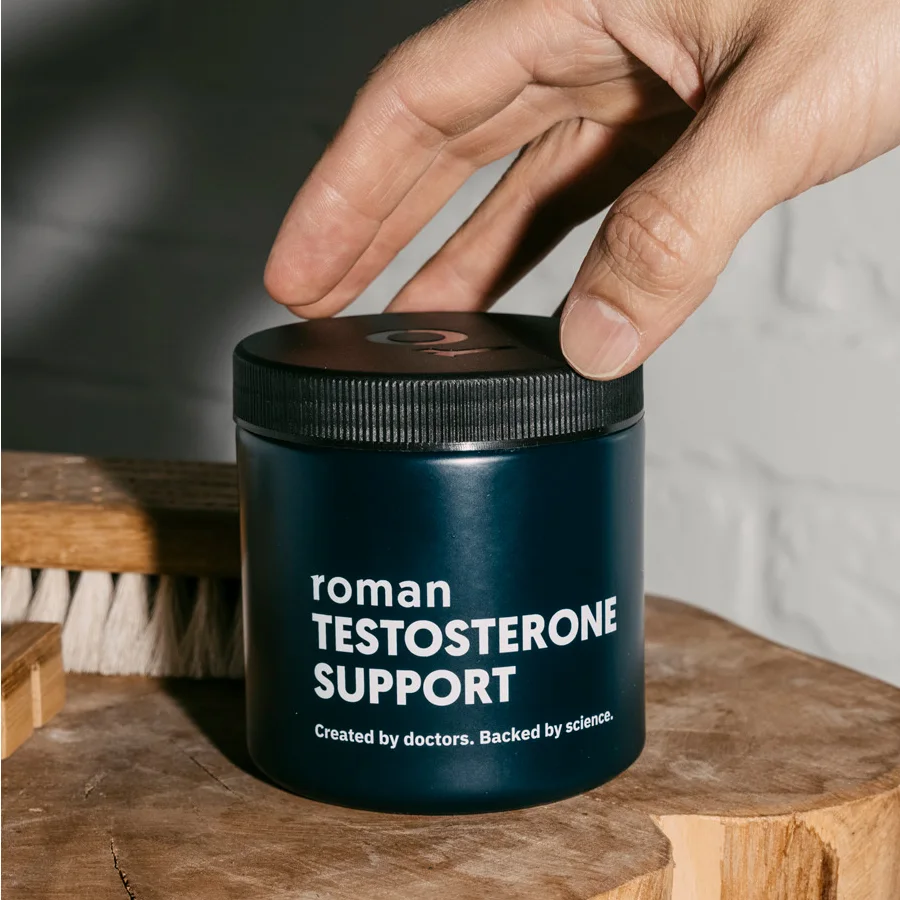Here's what we'll cover
Here's what we'll cover
Testosterone could use a new publicist. Over the years, it's become shorthand for some less-than-desirable “male” personality traits—aggression, violence, the inexplicable popularity of Nickelback. But the truth is, all people have testosterone, but it is present in much higher levels in men. Testosterone is vital and indispensable to several bodily processes, including sex drive.
So if you experience low testosterone (low T) or low libido, you may wonder—does testosterone increase sex drive? The connection isn’t entirely clear, but research shows that men with low testosterone are likelier to have a low sex drive. Continue reading to learn more.
What is testosterone?
Testosterone is an essential sex hormone for both men and women, but men have way more of it. It's mostly produced in the testicles in response to signals from the pituitary gland; some testosterone is also made in the adrenal glands, which sit on top of each kidney. Along with DHT (another hormone synthesized from testosterone), testosterone is responsible for the physical changes that occur in males during puberty, including secondary sexual characteristics like pubic hair growth, muscle growth, and sperm production (Nassar, 2021).
In men, testosterone plays a significant role in (Nassar, 2021):
Erectile function
Sperm production
Bone density and muscle mass
Red blood cell production
Growth of facial and body hair
Mood
Does testosterone increase sex drive?
Testosterone is one of the hormones that physiologically stimulate the male sex drive. How does it do that, exactly? Researchers aren't sure, but they've found that reduced libido is one of the most common symptoms of low testosterone levels (low T).
As part of the Massachusetts Male Aging Study (MMAS), researchers spoke with over 1,500 men about their sex drive, then measured their testosterone levels. The study found that the men who reported lower sexual desire had a higher chance of having low T (Travison, 2006).
Low testosterone and sex
Low T, also known as hypogonadism, is an abnormally low level of testosterone in the blood, usually defined as measuring less than 300 ng/dL (nanograms per deciliter). Normal testosterone levels are typically between 300 and 1,000 ng/dL, depending on who you ask. Keep in mind that low testosterone levels are just one part of the diagnosis of low T. Symptoms and signs of low testosterone also play a role, and some experts will recommend treatment even if T levels are slightly higher than 300 ng/dL, but the symptoms and signs are typical of low T.
Testosterone levels naturally decline with age. The decrease begins around age 30 and continues to drop about 1% each year. The pituitary gland sends fewer messages to the testes to produce testosterone, and the testes obey. Meanwhile, a protein called sex hormone-binding globulin (SHBG) increases in men as they age. All of this reduces the body's active (“free”) form of testosterone.
Because T affects many bodily systems, low testosterone levels can cause many symptoms, including fatigue, loss of muscle mass, increased body fat, and anemia (low red blood cell count).
Related to sex life, low testosterone can cause:
Loss of morning erections
Reduced sperm count
Infertility
Many people who experience low testosterone can resolve their symptoms with testosterone replacement therapy (TRT). However, not everyone is a candidate for TRT, and other treatments are available, such as clomiphene, a drug that can be used off-label to treat low T in men. A healthcare provider can help you create a safe treatment plan for low T.
Does low testosterone cause ED?
Low testosterone is one health condition that can cause erectile dysfunction (ED). Other health conditions that can cause ED include (McMahon 2019):
High cholesterol
Other causes of erectile dysfunction include certain medications like SSRIs, depression, anxiety, substance abuse, and lifestyle factors like lack of exercise (Irwin, 2019; Wang, 2018).
How to test for low testosterone
A healthcare provider can measure your testosterone levels with a blood test. T levels are usually highest in the morning and vary throughout the day. So, to diagnose low T, your healthcare provider may require two early-morning tests (usually between 7 and 9 a.m.) on different days to be low (< 300 ng/dL).
What is TRT?
Testosterone replacement therapy (TRT) is an FDA-approved treatment to increase testosterone and treat the symptoms of low testosterone. In essence, TRT gives your body the testosterone it isn’t producing. Testosterone therapy can be administered in several different ways, including (Bhasin, 2018):
A common side effect of testosterone replacement therapy is low sperm count. Artificial testosterone can cause your body to slow the production of sex hormones because it thinks you're making enough. This may slow sperm production and worsen your body's ability to make its own testosterone, which could make you dependent on continued TRT (Osterberg, 2014). Because Clomid doesn’t dull testosterone production like TRT, it maintains male fertility and can be an option for men who don’t want the side effects of TRT (Krzastek, 2019).
Other side effects of TRT can include acne, enlarged prostate, enlarged breasts, lower fertility, and worsening sleep apnea.
If you experience a chronically low sex drive or reduced sexual function, make an appointment with your healthcare provider. They can perform a blood test, evaluate you for other conditions that might cause your symptoms, and, if appropriate, prescribe a testosterone-boosting treatment that’s right for you.
DISCLAIMER
If you have any medical questions or concerns, please talk to your healthcare provider. The articles on Health Guide are underpinned by peer-reviewed research and information drawn from medical societies and governmental agencies. However, they are not a substitute for professional medical advice, diagnosis, or treatment.
Bhasin, S., Brito, J. P., Cunningham, G. R., et al. (2018). Testosterone therapy in men with hypogonadism: an Endocrine Society clinical practice guideline. The Journal of Clinical Endocrinology and Metabolism, 103 (5), 1715–1744. doi:10.1210/jc.2018-00229. Retrieved from https://pubmed.ncbi.nlm.nih.gov/29562364/
Irwin, G. & Mayans, L. (2019). Urology, an issue of primary care: Clinics in office practice. Elsevier . Retrieved from https://www.elsevier.com/books/urology-an-issue-of-primary-care-clinics-in-office-practice/irwin/978-0-323-67807-0
Krzastek, S. C., Sharma, D., Abdullah, N., et al. (2019). Long-term safety and efficacy of clomiphene citrate for the treatment of hypogonadism. The Journal of Urology , 202 (5), 1029–1035. doi:10.1097/JU.0000000000000396. Retrieved from https://pubmed.ncbi.nlm.nih.gov/31216250/
McMahon, C. G. (2019). Current diagnosis and management of erectile dysfunction. Medical Journal of Australia, 210 (10):469-476. doi:10.5694/mja2.50167. Retrieved from https://pubmed.ncbi.nlm.nih.gov/31099420/
Nassar, G. N. & Leslie, S. W. (2021). Physiology, testosterone. StatPearls . Retrieved on Jan. 6, 2022 from https://www.ncbi.nlm.nih.gov/books/NBK526128/
Osterberg, E. C., Bernie, A. M., & Ramasamy, R. (2014). Risks of testosterone replacement therapy in men. Indian Journal of Urology: IJU: Journal of the Urological Society of India, 3 0(1), 2–7. doi:10.4103/0970-1591.124197. Retrieved from https://www.indianjurol.com/article.asp?issn=0970-1591;year=2014;volume=30;issue=1;spage=2;epage=7;aulast=Osterberg
Travison, G. T., Morley, E. J., Araujo, A. B., et al. (2006). Relationship between libido and testosterone levels in aging men. The Journal of Clinical Endocrinology & Metabolism , 91 (7): 2509–2513. doi:10.1210/jc.2005-2508. Retrieved from https://academic.oup.com/jcem/article/91/7/2509/2656285
Wang, X. M., Bai, Y. J., Yang, Y. B., et al. (2018). Alcohol intake and risk of erectile dysfunction: a dose–response meta-analysis of observational studies. International Journal of Impotence Research, 30 (6), 342–351. doi:10.1038/s41443-018-0022-x. Retrieved from https://pubmed.ncbi.nlm.nih.gov/30232467/










